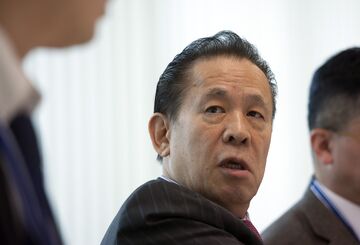Universal Entertainment Corp. Chairman Kazuo Okada said the Philippine gaming market could ultimately surpass Singapore as the Japanese tycoon prepares to open a $2.4 billion casino in Manila.
Philippine President Rodrigo Duterte’s move to thaw relations with China as well as his efforts to fight drugs and crime will help increase the number of Chinese visitors, Okada said in an interview in Manila Wednesday. At the same time, the businessman sounded a note of caution about jumping into the world’s newest casino market in Japan.
“A lot of Chinese are coming into the Philippines, and that will improve more as improving bilateral relations between China and the Philippines increase tourism here,” the 74-year-old said. Okada Manila opened this week for public preview and official opening is scheduled for the first quarter of 2017.

Photographer: Jerome Favre/Bloomberg
The Philippines is vying with Macau and Singapore to become a gambling hub targeting Asia’s rising middle class, even as the prevalence of high-stakes Chinese gamblers has been hurt by government crackdowns on corruption and capital outflow. Competition in the region is set to become more crowded, with Japan’s parliament passing a bill legalizing casinos this month, paving the way for billions of dollars of potential investments.
Philippine gross gaming revenue will probably reach $3 billion this year and may rise to $3.6 billion in 2018, said Rommel Rodrigo, an analyst at Maybank ATR Kim Eng. That’s still less than revenue from Singapore’s two casino resorts, which totaled $4.8 billion in 2015, according to data compiled by Bloomberg. Macau remains the world’s largest center for gambling despite a two-year slump, raking in $28.9 billion in 2015.
Okada Manila, which missed its previous deadline to open in November, will be the Philippine capital’s largest casino resort with over 26,000 square meters (280,000 square feet) of gaming space, and the third to open in Entertainment City, a 120-hectare (297 acres) site along the city’s bay that the government is developing into a casinos and leisure hub.
Okada said he expects the casino to become profitable in its first year of operations and to give a return on his investment in three to five years. It could seek a listing on the Philippine Stock Exchange in a year, he said.
Universal Entertainment shares rose 6.5 percent to 3,180 yen in Tokyo on Thursday, the steepest increase since Oct. 3. The benchmark Topix index fell 0.1 percent.
That profitability outlook may be a “very optimistic” forecast as the gaming market in Asia isn’t as strong as three years earlier, as the region faces rising political and economic uncertainties and China continues to curb gambling activity, said Justino Calaycay, head of research at A&A Securities Inc. In October, Chinese authorities detained 18 employees of Australia’s Crown Resorts Ltd., as the government clamps down on casinos that woo its citizens to gamble overseas.
“With China’s crackdown still ongoing, one has to be skeptical if there will be a big flood of players coming from China,” Calaycay said.
For Japan, CLSA Ltd. analysts estimated that potential gaming revenue could eventually reach more than $25 billion a year. Details of Japan’s casinos, or so-called integrated resorts, must still be laid out in an implementation bill before any casinos can be built -- meaning none are likely to open their doors in time for the 2020 Tokyo Olympics.
“I am very much interested in investing in Japan also for a casino -- but I feel that the rules would take a year to be fully-established, so we will consider it for one year,” said Okada, whose company is a manufacturer of gaming machines known as pachinko. “It’s one way to promote tourism to Japan, and it’s also a way in Japan to provide a different form of gaming other than pachinko to the people.”
While Yokohama and Osaka have been touted as potential venues for Japan’s first casino resorts, Okada said he sees the northern city of Sapporo as an attractive location due to its natural resources and good seafood, and its existing popularity with tourists. “I don’t have very high expectations when it comes to the gaming industry in Japan because economic growth has been very stable,” he said.
Still, the potential of casinos in Japan has drawn interest from the world’s largest gaming companies such as Wynn Resorts Ltd., MGM Resorts International and Las Vegas Sands Corp., as they eye the country’s large and wealthy population.

An artist rendering of Universal Entertainment’s Manila Bay Resorts at night.
Source: Universal Entertainment Corp.
Duterte, who assumed office in June 30, has made a pivot to China in a bid to attract investments from the world’s second-largest economy and thaw relations that cooled in the previous six years due to a territorial dispute. Yet, the Philippine president has also started his own anti-gambling campaign, vowing to destroy online gambling and electronic gaming parlors that have been loosely regulated.
“Our initial target is to have 30 percent of the guests from the international segment, but we would eventually like to bring that up to 50 percent,” said Okada. “ We are looking at China, Taiwan, Korea and Japan -- if you think about it from proximity, a lot of our guests will initially be coming from China and Taiwan.”
| < Prev | Next > |
|---|






 Copyright © 2025 ToCasino.net Online Casino. All Rights Reserved. Designed by
Copyright © 2025 ToCasino.net Online Casino. All Rights Reserved. Designed by